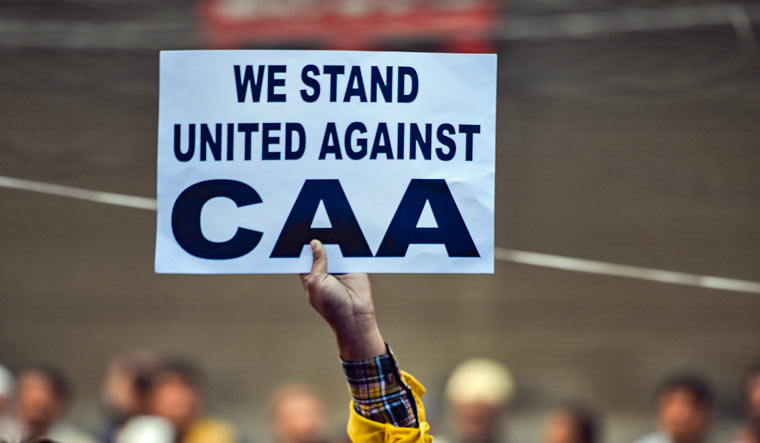Anti-CAA protests: Jamia student activists reel in fear as Delhi police summons another JCC member for questioning

Nazish Hussain, TwoCircles.net
NEW DELHI: Delhi Police on Saturday summoned another member of Jamia Coordination Committee (JCC) Mohammed Tasleem for ‘questioning’ in relation with Delhi violence that broke out earlier this year.
Twenty-six-year-old Tasleem is a second-year student of M.A International Relations at Jamia Millia Islamia in New Delhi.
A student leader from Jamia, Ramees confirmed to TwoCircles.net that Tasleem had been called in for questioning. “On Saturday at around 3 p.m. Tasleem texted from Jamia Nagar police station on a WhatsApp group about his interrogation,” Ramees said.
Tasleem has been actively covering Jamia protests against CAA since December last year. He runs a social media channel called Jamia World on Facebook and YouTube and has been covering anti-CAA protests in Jamia and Shaheen Bagh.
On 3 pm on Saturday, Tasleem posted on Jamia World that “Delhi Police special cell wants to interrogate me on Delhi violence, whereas I was not in Delhi during the period from 19 February to 6 March.”
Tasleem had clarified that he was only doing mobile journalism.
“He is an activist-journalist. Even before the protests, he has been covering things from Jamia,” says Ramees.
Tasleem originally hails from Bettiah, West Champaran, Bihar. He has been residing in Batla House in Delhi, as per Shahe Alam, a Jamia student.
“Tasleem was released on Saturday night, but he has been further asked to report on Monday,” said Ramees.
Delhi police special cell has been calling people for 'interrogation' in relation with the Delhi violence.
A student activist from Jamia Shaheen Abdullah told TwoCirlces.net that two police cases are going on currently.
“One is Jamia violence and the other is northeast Delhi violence. In Jamia violence, most of the students are giving statements as witnesses. For northeast Delhi violence, JCC members are being picked up and interrogated. All the students have gone underground for fear of getting arrested or being tortured by the police. They are not speaking with fellow students or using WhatsApp for fear of surveillance,” he said.
On 15 April, the Indian Express reported that more than 50 people have been served notice in relation with Delhi violence. Many Muslim residents of North East Delhi where violence broke out have also been called by Police for interrogation.
Ramees fears that the Delhi police is connecting everything with violence that occurred in North East Delhi. “Whatever happened, they will connect it to Delhi violence,” Ramees said.
Shaheen says that Jamia students were only focused on what was happening inside the university premises. “Students here never had any proper link or proper coordination with any protests happening outside. It is very strange, but one of the reasons is to crackdown the student movement. The potential of Jamia protest was that it made a ripple effect all over India, that could be one of the reasons but we don’t know what exactly happened,” he said.
Earlier, three JCC members – Meeran Haider, Safoora Zargar, and Shafa-ur-Rehman were arrested and charged with Unlawful Activities Prevention Act (UAPA), a legislation that has been criticized by rights groups.
Meeran, 35, is a PhD student at Jamia and was arrested on April 2. Meeran is the president of Rashtriya Janata Dal (RJD) youth wing Delhi Unit. He has been accused of hatching a conspiracy to incite communal violence in northeast Delhi.
Safoora Zargar, 27, is an M.Phil student from Jamia and was arrested on April 10. Safoora, who is also three months pregnant, was arrested for allegedly obstructing the road near Jaffrabad metro station. She has been charged under UAPA.
Shafa-ur-Rahman, a JCC member and president of Alumni Association of Jamia Millia Islamia, (AAJMI) was arrested on 26 April, in relation to northeast Delhi violence. He has been charged with UAPA and sent to jail.
Commenting on the UAPA charges on students, Abubakr Sabbaq, a Supreme Court lawyer told TwoCircles.net that the use of draconian laws against students is not only unjustified but arbitrary, inhuman and unjust. “These students like Safoora and Meeran only raised their voice against the law this government passed and they wanted it to be repealed. Charging them under UAPA for the same is the misuse of law,” he said.
Amnesty International has also criticized India’s use of UAPA against students and activists, terming it ‘a tool to repress dissent.’
Various other human rights organizations and activists’ groups have called UAPA a ‘draconian law’ and condemning its use against students.
Hum Bharat Ke Log, an umbrella group of civil society organizations have said that ‘the invocation of UAPA and the colonial sedition laws are inherently illegal.’
Supreme Court lawyer Sabbaq said that in a democracy the independence of the judiciary is paramount.
“When the Delhi High Court judge asked to register an FIR, the police had to file an FIR but instead of filing FIR the judge was transferred,” he said.
Sabbaq is referring to Delhi High court Judge Justice S Muralidhar, who was hearing the Delhi violence case. In late February, the bench headed by him expressed ‘anguish’ over Delhi police failure to register FIR against alleged hate speeches by three BJP leaders including Kapil Mishra. Subsequently, the Judge was transferred and a row erupted.
“It is loud and clear how this government is protecting its people. And, if the judiciary is independent,” Sabbaq said.
Citing examples of police discrimination against Muslims, Abubakr Sabbaq mentions two cases – the Bijnor Bomb Blast case of 2014 and Saifullah encounter in Lucknow of 2017.
“The accomplices in these cases were both Hindus and Muslims. While Hindus were charged separately under minor cases, Muslims got booked under sedition and UAPA,” he says.
